Annette Maye: interview with the German clarinettist from Cologne, Germany
Annette Maye was awarded the distinguished Künstlerinnenpreis NRW 2016. This is not the only award she got so far because she won the SWR world music competition in 1998. She studied at the Jazz department of the Conservatory of Music (Cologne) with Claudio Puntin and Frank Gratkowski. In addition to those formal studies she went to Paris with a scholarship to attend lectures at the 'Conservatoire National Supérieur de Musique et de Danse Paris'.
Annette Maye is the co-founder of the oriental jazz trio "ensemble FisFüz“ and performed in Switzerland, Italy, France, Luxembourg, Sweden, Austria, Poland, former Yugoslavia, Romania, Bulgaria, Russia, USA, Iran, Morocco, Tunisia, Egypt, Sudan, Jordan, Northern Iraq, India, South Korea and Japan.
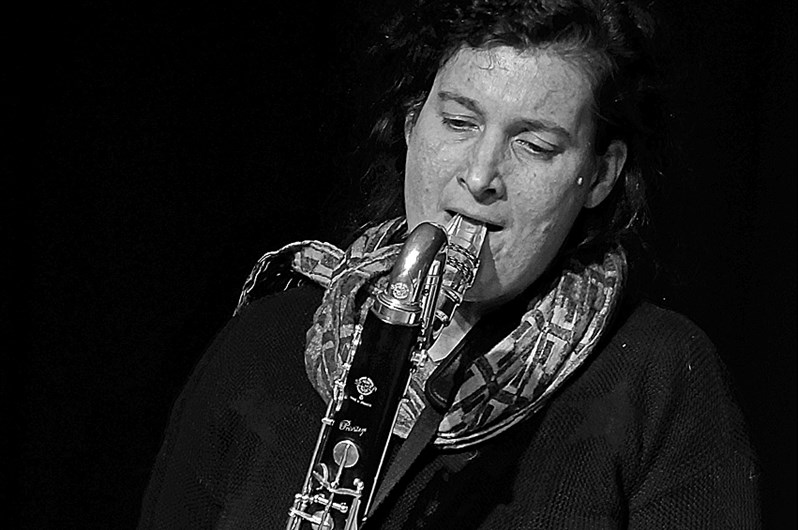
The clarinettist based in Cologne is currently also member of the "Duo Doyna", exploring the style of Klezmer as well as Sephardic music and turning it into a fusion enriched with jazz improvisation and free jazz elements. She is member of the „Multiple Joyce Orchestra“ for contemporary music, directed by the composers Matthias Schubert, Frank Gratkowski and Carl Ludwig Hübsch. Annette Maye is the clarinettist of the 'Tabadoul Orchestra' playing music of the famous Egyptian composer Mohamed Abdel Wahab. She is the artistic director of 'Multiphonics Festival', a festival for jazz, world music and improvised/contemporary music with focus on the clarinet. She founded the band 'Annette Maye´s Vinograd Express' lately and acts as the band leader.
During the interview Udo Moll, the trumpetist of the band Annette Maye's Vinograd Express and a distinctive scholar as far as John Zorn's music is concerned, came along to talk about the work by Zorn.
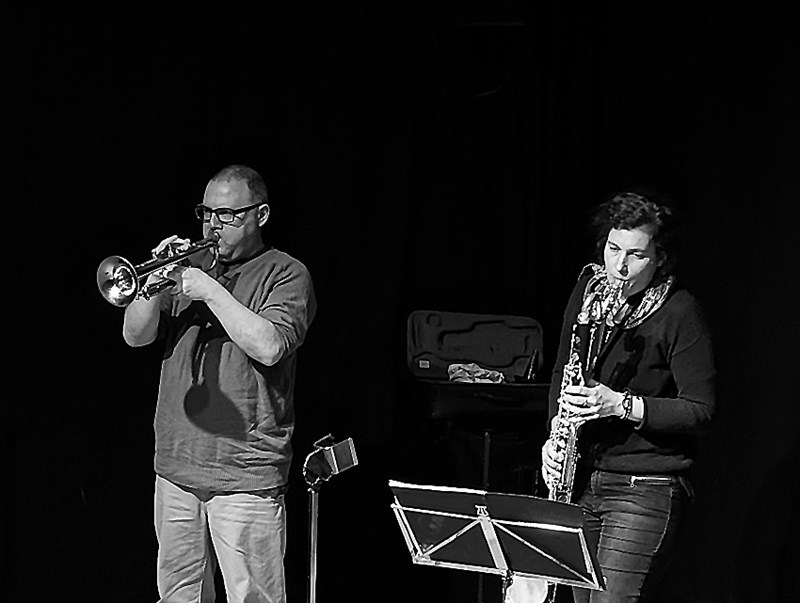
How important was music during your childhood? Was it an important part in your early life? Nobody is born as a musician. Therefore you need some motivation and influence to turn into one.
AM: My father was singing in a choir mainly Bach oratories, Baroque music and classical repertory. My parents listened to classical music as well as to Jazz at home. I have a brother who is ten years older than me. When I grew up he was already playing cello and later double bass and electric bass. He played in a school band. That was the first School Big Band founded in the state of Schleswig-Holstein. This band project started already in the 70s. Music was an important subject in my family although nobody was a professional musician. In primary school I had a lot of fun with the so called Orff instruments.
Do you remember the first Jazz tunes you heard?
AM: It was through my father who listened to three cassettes with some Dixieland and old time Jazz recordings while driving the car. When we travelled to Scandinavia we listened to those cassettes all the time. I could sing every bar of this music when I was six, seven, eight years old. Moreover, my father was a big fan of Oscar Peterson and sometimes in the weekends we listened to the old discs my father had ordered from the United States when he had been a student.

Why did you pick the clarinet as your instrument?
AM: I have to tell you that I started with the recorder (i. e. English flute) in the kindergarten. I found out that I like to play a woodwind instrument. The teacher picked me for a performance in front of the class. The first classical instrument I started with was the piano when I was eight years old. After four or five years playing the recorder I wanted to play an instrument I can use in an orchestra setting. We had a clarinet at home, an old instrument of my father. I tried to play it but I was thinking as well about playing the horn. In the end I chose the clarinet reflecting that I could play in the School Big Band then but as well some classical music. You are not limited to one genre of music when playing the clarinet.
Is it a cliché that the clarinet is either linked to Swing like the tunes Benny Goodman used to play or to Klezmer?
AM: It is not true. I organize a clarinet festival (Multiphonics Festival) since 2013 and I came across a lot of styles in Europe. It is not that common. You like to think in categories. Swing was a type of Pop music in former times. The clarinet became the doubling in a Big Band and it is not so important any more. In terms of Jazz everyone is thinking of Swing but we see as well some extraordinary clarinettists in contemporary Jazz too. It is very common in the contemporary music. The clarinet is as well in touch with improvised music.

Why and when did you discover John Zorn and the Masada Songbook with 200 songs?
UM: I think it is even more. It is something like 400. I have a very long lasting story with John Zorn. When I studied trumpet at the Musikhochschule Köln I was very interested in John Zorn because he was such a radical guy at that time. I found it super cool that he was and is so uncompromising. He is pushing his own development and he is taking a lot of risk. I wrote my thesis about the music of John Zorn and the Lower Eastside Avant-garde scene. I followed his work over the years.
Zorn is very productive and releases CD after CD. After some time I lost track a bit about the completeness of his recordings because I could not listen to everything he had composed and recorded. But Zorn is somehow more or less surrounding me. I can relate to John Zorn because I am interested in a lot of different music genres like contemporary music, Baroque music, Jazz, Free Jazz, improvised music, Funk and Soul. John Zorn incorporates a very broad range of styles in his music and that is very attractive for me.
After Naked City, my first favourite super band, I was very much interested in Masada - the most Jazz related group of John Zorn. I liked it especially because it had a link to the early Ornette Coleman 4tet with Don Cherry and Charlie Haden. It had the same instrumentation with alto saxophone and trumpet. Somehow it has the same approach to how to play the tunes. The tunes of John Zorn are not very complicated neither the Ornette Coleman tunes. That gives a lot of freedom without being directly Free Jazz in an idiomatic sense. That is still a very interesting topic for me. As much as I love Free Jazz and free improvisation I always think that it would be great to have some material that you can rely on and connects the band and finally makes it easier to connect with the audience. Still you can have a lot of freedom with simple tunes, more than with complicated Bebop tunes with a lot of chord changes. That was the reason why I could relate to the Masada project.
Zorn traces his Jewishness with that project. Some of the titles are strongly related to religious confession, the bible and the Hebrew rituals. Why have you been so attracted by Zorn's approach and the music he composed? Maybe you can describe the importance of John Zorn for you and the influence for your own compositions.
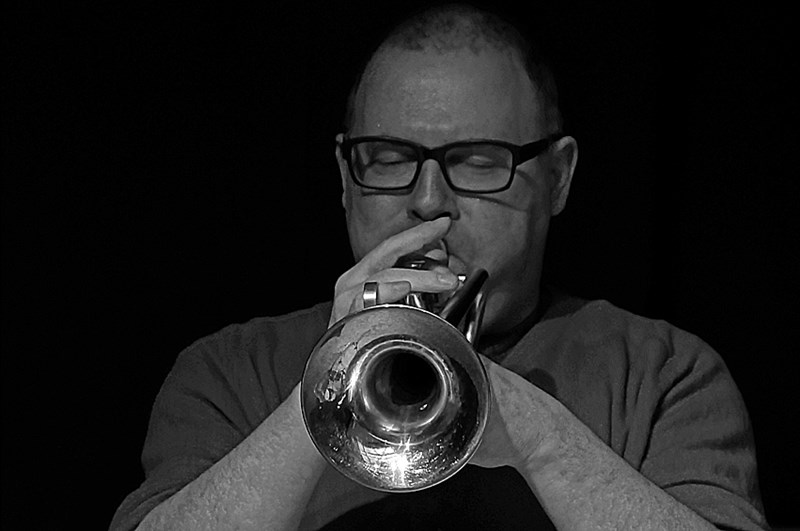
AM: I came across the Masada songs 14 or 15 years ago during my studies at the Conservatory Cologne. I was very busy with Turkish music and folk music in general before I started my formal studies at the Conservatory. It was by chance that I found the CD of the Masada project at the library. When I listened to the recordings I was surprised and it was a new cosmos for me. I thought my interest in folk music connected well with Zorn's music. Many years later I started the project with Udo Moll who is responsible for the transcriptions of the tunes.
In every concert it is completely different what we do and it is really developing from tour to tour. When we rehearsed today with our substitute bass player Oliver Lutz, he was telling us that some parts of the music have completely changed since we´ve played the last concert together with him 5 months ago. The music is alive and drifts from time to time. The very nice tunes give a base for our performence. The tunes move me and I like the oriental flavour in it. I am not interested in the ideology behind the songs. I play together with a guitarist a lot of Klezmer music as well but it's more a World Jazz music project than a Klezmer project. We break the chains of the traditions in comparison to other Klezmer bands. Klezmer is emotion and energy for me, nothing else. Okay, this genre of music fits to the clarinet quite well. I think our concept of performing is way beyond confession and religion but we did not ask John Zorn what he thinks about it.
Zorn strongly promoted another type of music away from Klezmer performed at the Bar Mitzwa or a Jewish wedding. He always sees himself as someone quite fond of surf music. That's what he wanted to share. When I listened to recordings from 1999 taken during Jazz Middelheim I discovered oriental flavoured melodies plus Free Jazz.
AM: It is not forbidden to have riffs or grooves. The elements are sometimes quite obvious but at the same time the free spirit is there as well. It's very fascinating. You rarely find such music.
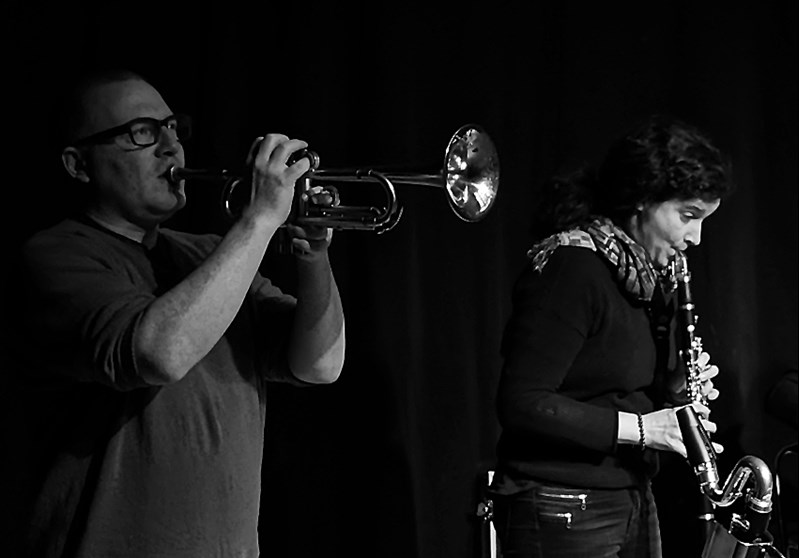
What's about your own compositions? How do you approach John Zorns compositional work?
UM: In my case I would say that not so much the Masada songs influenced me in relation to my compositions but it's a lot of the other stuff John Zorn is doing like the film music or 'Kristallnacht' (footnote: Zorn's compositions for the album were based around the events before, during, and following the infamous 'Night of Broken Glass' and represented his first musical exploration of his Jewish cultural heritage.) It is more the bigger formats.
He is also an extremely eclectic guy. He always was. He is writing string quartets. For me these string quartets are much more interesting than the Masada songs. Of course he did not invent such music apart from the radical Jewish music but for a lot of music he took stuff he had heard. He worked for quite a while in a record store. He takes out of music history what he likes but he adds his very personal flavour. He never really asked somebody if it is ok for him to write a string quartet. I think he did not care if anyone of the serious academic composers likes it or not.
This is somehow also my approach. I studied Jazz trumpet as well as New Music composition with a guy who played with Stockhausen in the 70s. I do not see myself as a strictly serious contemporary music composer but on the other hand I am not a strict Jazz musician either. I really like to be open minded and to do things I have the feeling that these are my aesthetics and my style. I don't need the approval of others. I take this and that piece of music as long as it makes sense to me and is coherent. That is my connection with Zorn because he also takes that kind of freedom in composing.
The setting of the quartet is not so important because in comparison with Zorn there is no alto saxophone in your band.
AM: Sometimes we invite the alto clarinettist Gianluigi Trovesi who is a very open minded person as far as the music is concerned. He plays early music and also Italian folk music as well as different subgenres of Jazz like swing, bebop, hard bop, free jazz and music from other eras, a. o. the contemporary music inspired him during his long musical career. He is a cosmopolitan in reference to music. He also fits very well in the project. We are not really big fans of the saxophone in general.
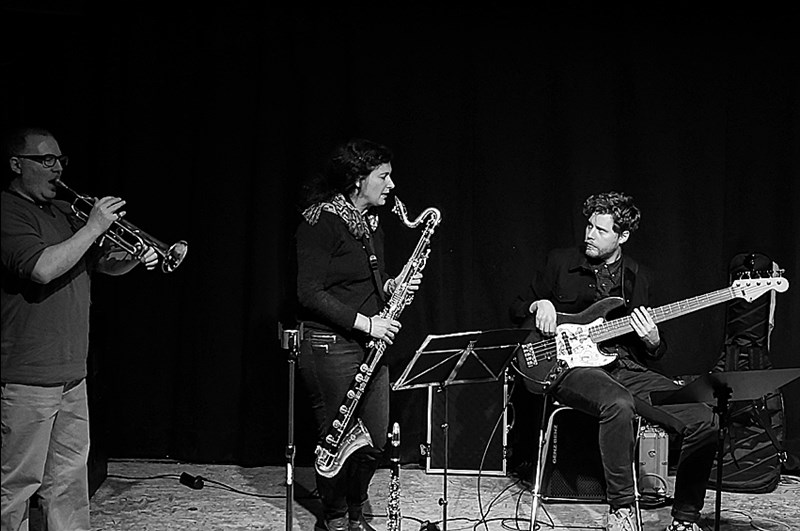
Why that? Some regard the alto saxophone as very close to the human voice.
AM: No, the cello is also close to the human voice, and the clarinet as well. I improvised a lot with female singers. When I was listening to the recordings I could sometimes not figure out if it is the clarinet or the singer´s voice.
UM: When we talk about cliché there is a much bigger one about the saxophone. Historically the most important figures in Jazz like John Coltrane, Charlie Parker, Sonny Rollins and Michael Brecker are saxophone players. Therefore everybody has the idea that Jazz is a kind of saxophone linked music. That's not true. That is a quite complicated story (with us not particularly liking saxophones). The reason why we are not especially fond of the saxophone is related to the omnipresence of it. The saxophone for me, at least how it is very often played, is also a quite vulgar instrument. In those cases, if it is similar to a human voice then that of a very nerving woman (AM: market seller!). There are of course exceptions amongst alto saxophone players I really love.
AM: By the way, I like the tenor sax playing of Sonny Rollins and John Coltrane. But I want to present the clarinet in its beauty and variety. Many people know the clarinet only in Swing and Klezmer and I want to show that there is much more to explore.
Apart from Vinograd Express you, Annette, perform as well with FisFüz. The music of this band seems a mixture of Klezmer, Balkanova, Oriental Music. Do you see it as a sort of World music and how important is FisFüz for you?
AM: FisFüz is as well a project where I can find a kind of freedom because we play a lot of differently focused programmes. We play our own composition and not mainly traditional folk music. Playing traditional folk tunes happened only in the past. We try out as well bringing in new instruments and techniques on oud. It is not the traditional way of playing we do. We go across the borders in the way we are playing the music of for example Mozart, some Ottoman composers, Gianluigi Trovesi, or in the way we compose. I would label it as a kind of World Chamber Music. I like a very minimalistic instrumentation. That means three musicians playing two melody instruments and percussion. It is quite surprising what you can achieve with such a small ensemble. We change instruments in one piece whilst the music continues. Since I play the bass clarinet I change my role during the performance, too. I accompany for instance the oud solo or the percussion solo. We improvised freely as well: Most would see it as a World Music project, of course. Our CDs are sold under the label 'World Music'.
Was it in some respect a natural process to develop Vinograd Express considering you take here as well elements of Free Jazz, Jazz and folk music to create a new melange?
AM: It is very close to my personality.
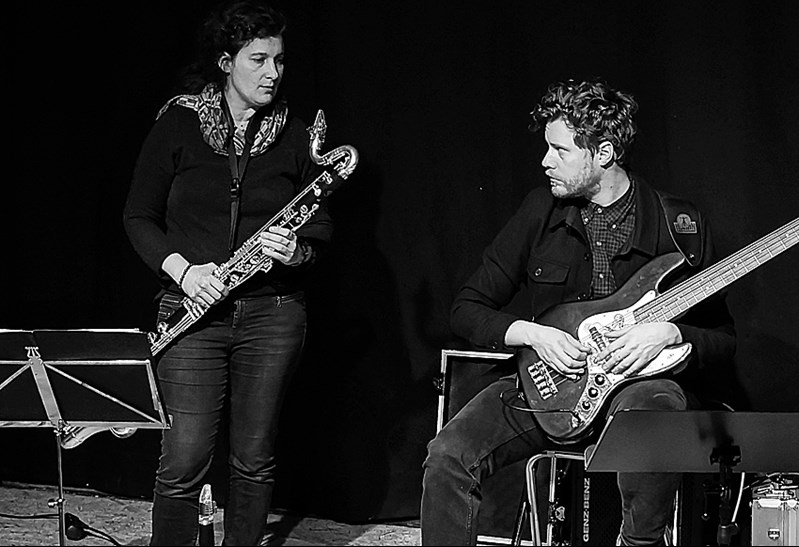
Would you mind to explain the band name Vinograd Express please. It sounds like an urban place in south eastern Europe and reminded me to Belgrad and Visegrad as far as the sound of the name is concerned.
AM: It has an urban character. The music we perform is composed by John Zorn who lives in New York City. That means the music has to have a very urban background but Vinograd is not a city but the Pan-Slavic name for 'grape'. Why the grape? Okay, Weintraub or Vinograd is as a second Jewish name not uncommon. In NYC you can find a few famous musicians with this name. I really love the name Weintraub. I like the sound of it and therefore I made a fusion of the urban character and my Slavic interest because I love Slavic languages. I completed my degree in Russian language at the university of Freiburg in 1999s. And it is a name people can remember because you have to look for such a name.
How do you see your role in the band Vinograd Express? Leader, co-leader, composer or band leader in the classical meaning of the term? You put your name before Vinograd Express and therefore I would consider that you are the band leader.
AM: I am the classical band leader. In the very beginning it was only Vinograd Express. Then I found out that people like to go on stage and play but not willing to do something beside playing. I found myself in the role of organizing the CD recordings for instance. In the days of the recording sessions I decided to take up the role as band leader and talked about it with my musicians. They told me that it is okay. That is the first time in my life that I placed my name in front of a band name. It was a bit strange for me because I was not used to it. I am organizing everything and I submit one or the other of my compositions to the band but I do not see anyone in the band as the main composer. Composing and arranging is a collective process with a lot of collective improvisation. Everybody has an input in the music we play.
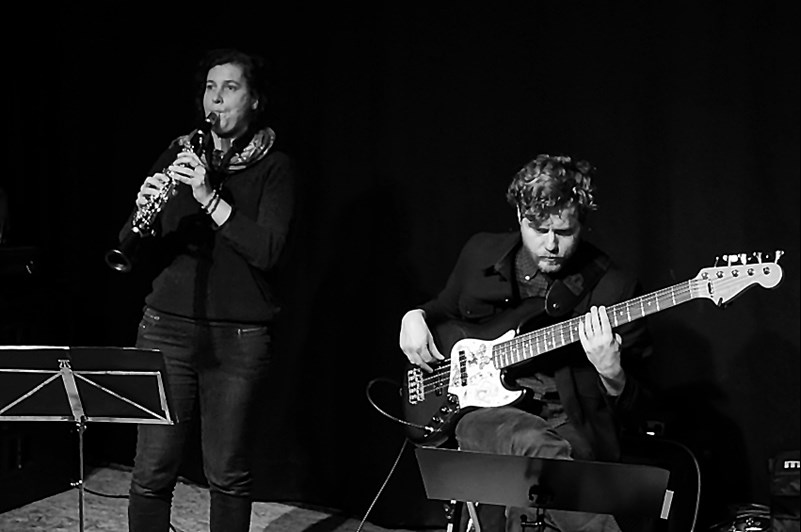
How important is random and control in the music of Remembering Masada?
AM: The only control we have are the themes of the composition of John Zorn but we also deconstruct the themes, taking single notes of it or very short phrases of the themes and playing around with it. Improvising is most important and we love to do. About maybe 70 or 80% is improvisation and the rest are themes, the riffs and the grooves but it is developing more and more in the direction of free improvised music. The themes of John Zorn´s Masada songbooks are like a vehicle, we travel with it into the large cosmos of free improvisation.
It is getting more and more free with every concert we are doing. It is very nice to see. The project is like a living creature!
Thanks for talking with you.
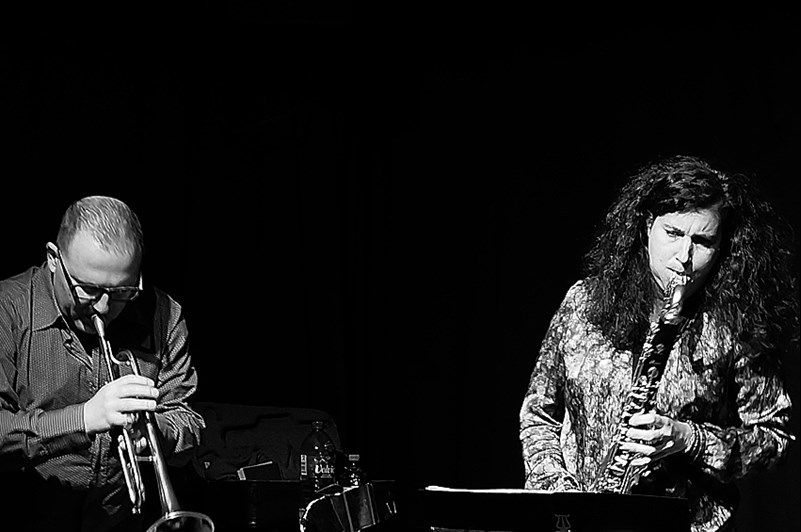
Interview and photos: © ferdinand dupuis-panther
Informations
Annete Maye
http://www.annettemaye.com
http://www.fisfuez.de
http://www.multiphonics-festival.com
http://www.facebook.com/vinograd.expressHomepage
https://myspace.com/annettemayeclarinets/music/songs
Udo Moll
http://www.udomoll.de/
CD review
http://www.jazzhalo.be/reviews/cd-reviews/e/ensemble-fisfuez-plus-gianluigi-trovesi-papillons/
Masada Songbook
http://www.npr.org/templates/story/story.php?storyId=5009271
John Zorn
Other
In case you LIKE us, please click here:

Foto © Leentje Arnouts
"WAGON JAZZ"
cycle d’interviews réalisées
par Georges Tonla Briquet

our partners:



Hotel-Brasserie
Markt 2 - 8820 TORHOUT

Silvère Mansis
(10.9.1944 - 22.4.2018)
foto © Dirck Brysse

Rik Bevernage
(19.4.1954 - 6.3.2018)
foto © Stefe Jiroflée
Philippe Schoonbrood
(24.5.1957-30.5.2020)
foto © Dominique Houcmant

Claude Loxhay
(18/02/1947 – 02/11/2023)
foto © Marie Gilon

Pedro Soler
(08/06/1938 – 03/08/2024)
foto © Jacky Lepage
Special thanks to our photographers:
Petra Beckers
Ron Beenen
Annie Boedt
Klaas Boelen
Henning Bolte
Serge Braem
Cedric Craps
Luca A. d'Agostino
Christian Deblanc
Philippe De Cleen
Paul De Cloedt
Cindy De Kuyper
Koen Deleu
Ferdinand Dupuis-Panther
Anne Fishburn
Federico Garcia
Jeroen Goddemaer
Robert Hansenne
Serge Heimlich
Dominique Houcmant
Stefe Jiroflée
Herman Klaassen
Philippe Klein
Jos L. Knaepen
Tom Leentjes
Hugo Lefèvre
Jacky Lepage
Olivier Lestoquoit
Eric Malfait
Simas Martinonis
Nina Contini Melis
Anne Panther
France Paquay
Francesca Patella
Quentin Perot
Jean-Jacques Pussiau
Arnold Reyngoudt
Jean Schoubs
Willy Schuyten
Frank Tafuri
Jean-Pierre Tillaert
Tom Vanbesien
Jef Vandebroek
Geert Vandepoele
Guy Van de Poel
Cees van de Ven
Donata van de Ven
Harry van Kesteren
Geert Vanoverschelde
Roger Vantilt
Patrick Van Vlerken
Marie-Anne Ver Eecke
Karine Vergauwen
Frank Verlinden
Jan Vernieuwe
Anders Vranken
Didier Wagner
and to our writers:
Mischa Andriessen
Robin Arends
Marleen Arnouts
Werner Barth
José Bedeur
Henning Bolte
Erik Carrette
Danny De Bock
Denis Desassis
Pierre Dulieu
Ferdinand Dupuis-Panther
Federico Garcia
Paul Godderis
Stephen Godsall
Jean-Pierre Goffin
Claudy Jalet
Chris Joris
Bernard Lefèvre
Mathilde Löffler
Claude Loxhay
Ieva Pakalniškytė
Anne Panther
Etienne Payen
Quentin Perot
Jacques Prouvost
Renato Sclaunich
Yves « JB » Tassin
Herman te Loo
Eric Therer
Georges Tonla Briquet
Henri Vandenberghe
Peter Van De Vijvere
Iwein Van Malderen
Jan Van Stichel
Olivier Verhelst



